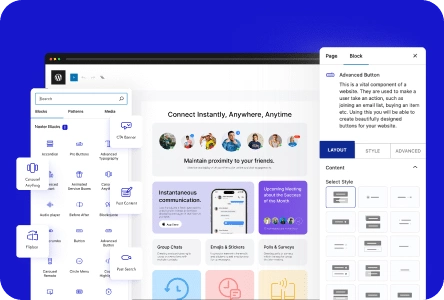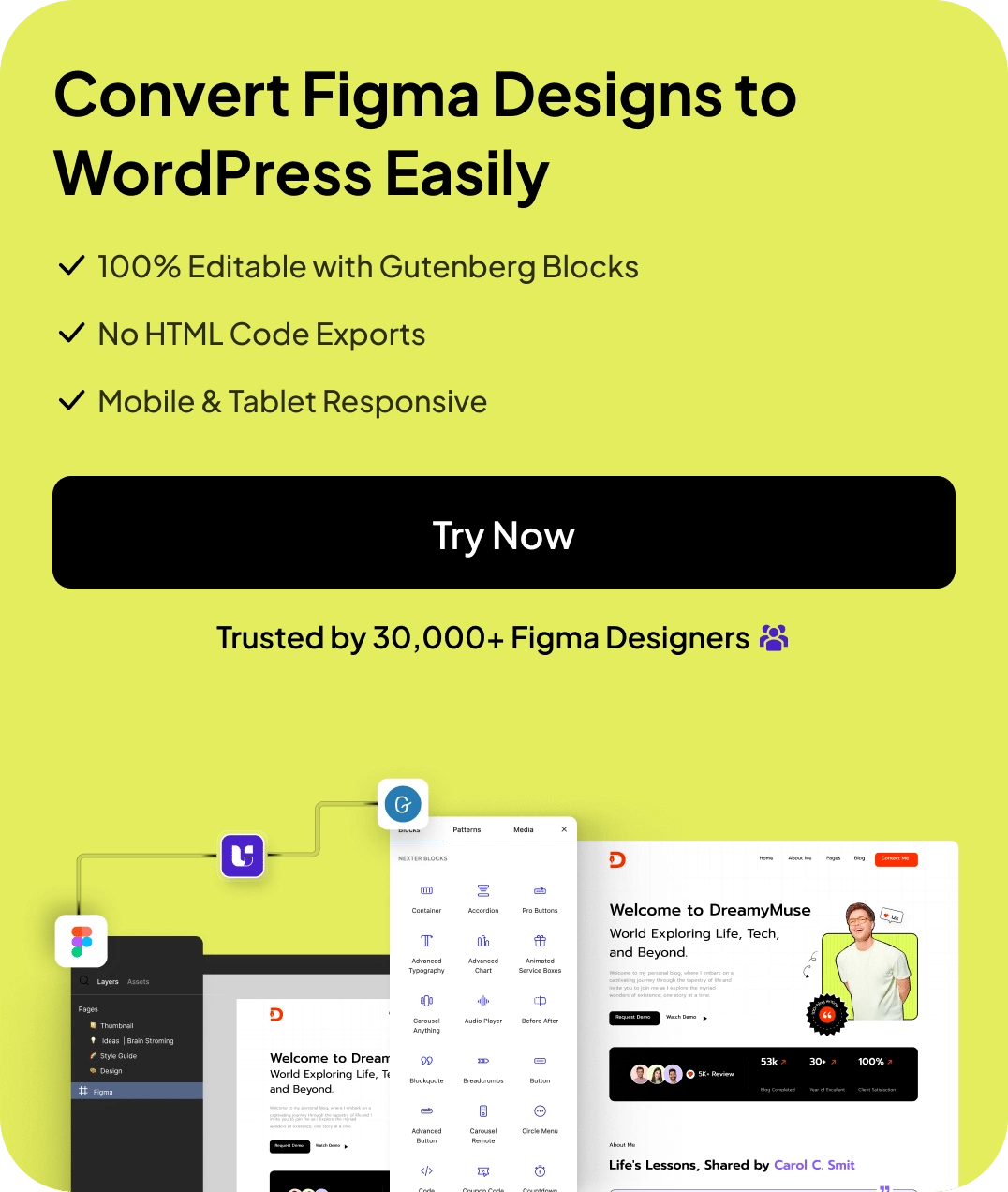A great website begins with a great WordPress page builder. And if you’re confused between Gutenberg vs Divi, we’ve got you covered!
A good page builder allows you to design, customize, and manage stunning websites without prior technical knowledge.
These page builders are easy to use and offer unique features like custom design elements, access to a readymade template library, themes, customizations, and more to create an attractive website.
In this regard, Divi and Gutenberg are popular page builders that have gained a massive user base and stand out as excellent choices thanks to their beginner-friendly and intuitive interface.
However, both these page builders bring a range of unique features and design capabilities to the table.
In this article, we’ll explore which page builder is better for you – Divi vs Gutenberg.
What is Gutenberg?
![Gutenberg vs Divi: Which is Better for You? [8 Key Differences] 1 Gutenberg WordPress Editor](https://nexterwp.com/wp-content/uploads/2024/05/Gutenberg-WordPress-Editor.png)
In WordPress 5.0, the Gutenberg editor was introduced to replace the classic editor with a new block-based approach to website creation.
Gutenberg simplifies the website design process with a visual builder and access to plenty of useful blocks to add various functionalities to the website without coding.
These blocks include design elements, page layouts, formatting tools, and more to help you customize the website however you want to.
Pros and Cons of Gutenberg
Pros
- User-friendly: Gutenberg is easy to use and navigate, making it easy for users, especially beginners, to create and customize websites.
- Block-level editing: The Gutenberg editor divides contents into blocks such as text, images, headlines, mega menu, and more. This allows for easy editing and organization of content.
- Highly compatible with WordPress: Since Gutenberg is a core feature of WordPress, it is also compatible with most WordPress features and plugins. This allows you to enhance the functionality of the website easily.
Cons
- Limited customizations: Gutenberg only offers you the basic design options and customizations to build a functional website. This can restrict creativity, and you may have to install other plugins to get more options.
- Compatibility issues with third-party tools: You might experience compatibility issues with some third-party themes and plugins.
- Slower performance: Compared to other page builders like Divi, Gutenberg has slow performance issues.
What is Divi?
![Gutenberg vs Divi: Which is Better for You? [8 Key Differences] 2 What is Divi](https://nexterwp.com/wp-content/uploads/2024/05/What-is-Divi.png)
Divi is an advanced drag-and-drop page builder for WordPress created by Elegant Themes. Like Gutenberg, Divi also offers a user-friendly interface that allows you to build visually attractive and responsive websites without any coding knowledge.
The page builder’s frontend editing capabilities and live visual editing feature let you view your design changes in real time.
The editor features many customization features along with a range of pre-built elements and modules, such as a readymade template library.
In addition, users can customize every section of their website, which gives them full flexibility and control over how their website looks.
Pros and Cons of Divi
Pros
- Tons of customizations: Divi brings you a range of customization features for content spacing, sizing, colors, margins, animations, and much more to create a visually engaging website.
- Integrated WordPress theme: The page builder comes bundled with the Divi theme, which is a powerful WordPress theme to build high-quality websites from scratch. With visual editing features, a theme builder, and plenty of design features, the Divi theme is a must-have for your website.
- Customizable modules: Similar to Gutenberg “blocks”, Divi offers 200+ customizable “modules” to let you design, modify, and arrange website content easily.
Cons
- No free version: Divi Builder does not offer a free version. Also, it is integrated with the Divi theme, so you don’t have the option to purchase the page builder separately.
- Too many options: Having access to tons of customizations can also make the design process overwhelming, especially for beginners.
- Coding for advanced features: The page builder may require basic coding knowledge if you want to use its advanced customization features, which can be a blocker for beginners.
Gutenberg vs Divi [Key Differences]
Divi is a quality WordPress page builder with advanced functionalities and design features for creating a visually stunning, high-performance website.
Gutenberg, however, is a great page builder for beginners who are looking for simple features to create a basic yet quality website.
Let’s explore the key differences between Gutenberg and Divi in detail-
| Features | Gutenberg | Divi |
|---|---|---|
| Ease of use | It is perfect for beginners as it offers easy navigation and simplifies the design process. | While Divi is easy to use, it can take some time to understand the page builder and navigate through it. |
| Builder options | Offers basic tools and blocks to create a functional website. | It offers settings to manage website performance, integration, API control, and more. |
| Design elements | Offers blocks to add various media and text elements. | Offers 200+ modules for content, design, and other functionalities. |
| Speed and performance | Offers decent website speed and performance owing to its minimal built-in and clean code. | Optimized for high speed and performance. |
| SEO and visibility | The website can be optimized for SEO with content and performance optimization. | Built-in options such as cache clearing can help boost website SEO. |
| Templates collection | No built-in template library | Access to an extensive library for full website templates and page layouts. |
| Flexibility and customization | Customization features are limited and can be extended using third-party plugins. | Tons of customization options within the module settings |
| Pricing | Free | Divi- $89/year or $249 for the lifetime plan Divi Pro- $569/year or $729 for the lifetime plan |
1. Gutenberg vs Divi: Ease of Use
One of the most important features to consider in your page builder is its ease of use.
You would want a page builder that offers an intuitive and user-friendly interface for a quick and simple website-building process.
In this regard, while both WordPress Gutenberg vs Divi offer a user-friendly platform to build your website, they follow different approaches to do so.
Gutenberg
![Gutenberg vs Divi: Which is Better for You? [8 Key Differences] 3 Gutenberg Editor](https://nexterwp.com/wp-content/uploads/2024/07/Gutenberg-Editor.webp)
Gutenberg has a clean, minimal, and streamlined user interface that focuses on the basics of website creation. To add new blocks, simply click on the ‘+’ icon and choose from a range of blocks for your website.
Once you add the block, click on it to open additional settings for styles, color, sizing, and more in the right-hand sidebar.
Moreover, you can see all the changes and additions live since it is a visual editor.
With every element and setting available on the right side of the editing window, the navigation becomes easy and simplifies the design process.
It is excellent for bloggers or website owners who want to build a simple, text-based website.
Divi
![Gutenberg vs Divi: Which is Better for You? [8 Key Differences] 4 divi user interface](https://nexterwp.com/wp-content/uploads/2024/05/divi-user-interface.webp)
Divi makes website creation easy with its drag-and-drop builder and visual interface, where you can add various modules and see the changes in real time.
Divi offers an organized framework. The interface displays all the customization tools, elements, and settings, making it easy to navigate.
You can simply use the desired elements, customize them, and rearrange them.
At the same time, this can also be overwhelming for new users as it may take some time for them to understand the layout and find their way around the tool as there are too many options available.
It also features a selection of pre-defined column layouts, making it easy for you to start designing the website.
One unique feature of Divi is its wireframe mode in the user interface. You can enable this mode to reveal the underlying structure of the content and use it to restructure the website.
2. Gutenberg vs Divi: Builder Options
In-built page builder options such as header & footer builders, performance settings, CSS compatibility, and so on give you the ability to modify your website to align with your business.
Here’s how Divi Builder vs Gutenberg compares in terms of builder options.
Gutenberg
Gutenberg offers you all the basic tools and elements you need to develop a simple, minimal, and fully functional website.
In addition, you have access to a great collection of blocks with which you can add numerous interesting features to your website.
Gutenberg also offers a Block Manager, which allows you to easily toggle on or off various blocks as per your requirements.
That said, Gutenberg lacks the extensive builder options to customize your website.
To create custom headers & footers, 404 pages, archive pages and more, you’ll need to use third-party theme builders or plugins, such as the Nexter Blocks.
Nexter offers a free theme builder called “Nexter Builder”. It allows you to create custom theme sections with ease using Gutenberg drag-and-drop blocks.
![Gutenberg vs Divi: Which is Better for You? [8 Key Differences] 5 Nexter builder](https://nexterwp.com/wp-content/uploads/2024/02/Nexter-builder.png)
Snapshot of Free Advanced Nexter Theme Builder
Divi
When it comes to builder options, Divi offers much wider options than Gutenberg. Firstly, the page builder has settings to manage the website performance, integration, API control, and more.
Then, the builder also gives you the ability to save and manage your custom designs for later use.
Also, it features an integrated theme builder, so you have complete control over every section and element of your website. With it, you can easily customize the website header, footer, body, and more.
But that’s not it. The page builder also has a library to manage your templates and existing website designs. You can save your custom designs for later use and edit, import, and export the website templates.
Enhance your website design and content with custom header and footer. Learn How to Create Header & Footer in WordPress in this Beginners Guide.
3. Gutenberg vs Divi: Design Elements
The design elements of your page builder will decide how visually engaging your website is for a better user experience.
In this regard, both Gutenberg vs Divi have their features and settings to make your website stand out.
Gutenberg
Gutenberg brings you an impressive collection of over 100 blocks for your website. You can use these blocks to add different design elements and content, from single images and galleries to headings and lists.
![Gutenberg vs Divi: Which is Better for You? [8 Key Differences] 6 Gutenberg Design Elements](https://nexterwp.com/wp-content/uploads/2024/05/Gutenberg-Design-Elements.png)
You can easily rearrange these blocks to organize your website content and elements. Additionally, you can build multi-column layouts using custom CSS or shortcodes.
Further, the reusable blocks (now known as synced patterns) are a collection of content snippets that you can use across the website.
This is a great way to maintain a consistent website design across various posts and pages.
To add extra functionalities to your website, such as animation effects or a custom navigation menu, you’ll need to use third-party theme builders or plugins, such as the Nexter Blocks.
Nexter Blocks gives you access to 90+ unique Gutenberg blocks to add impressive features to your website and take the user experience to a whole new level.
Divi
Divi, too, brings you extensive design element options with 200+ modules for custom buttons and icons to search bar options, tables, media support, and much more.
The built-in theme builder allows you to modify every element of the website, while a custom CSS control can be used to Divi’s visual design controls with the developer’s own custom CSS.
![Gutenberg vs Divi: Which is Better for You? [8 Key Differences] 7 Divi Design Elements 1](https://nexterwp.com/wp-content/uploads/2024/05/Divi-Design-Elements-1.png)
Whether you’re designing a blog page, CTAs, forms, galleries, or carousels, you have a readymade module for everything.
![Gutenberg vs Divi: Which is Better for You? [8 Key Differences] 8 Divi readymade modules 1](https://nexterwp.com/wp-content/uploads/2024/05/Divi-readymade-modules-1.png)
4. Gutenberg vs Divi: Speed and Performance
When it comes to comparing WordPress Gutenberg vs Divi for speed and performance, Divi stands out as a faster website page builder than Gutenberg.
But that does not mean Gutenberg is slow in itself. Being a WordPress core page builder, Gutenberg is built for speed and performance because it does not add weight to your website, unlike third-party plugins.
With Gutenberg, you can turn off the blocks you don’t need, which can help optimize your website for speed and ensure better performance. It also offers a load-in-line styles sheets feature, which further helps you speed up the site.
On the other hand, Divi is a little faster than Gutenberg, thanks to its dedicated settings for optimizing performance.
Divi’s dynamic module framework loads only the necessary modules for each page and prevents bloats. Plus, the dynamic CSS does not load unwanted CSS on your site, giving you faster loading times.
Is your website performing slowly causing you to lose visitors? Check out 20+ Tips to Speed Up Your WordPress Website.
5. Gutenberg vs Divi: SEO and Visibility
A critical aspect of high SEO ranking and website visibility is the site performance and overall user experience. A website that prioritizes these factors in addition to great content may achieve higher search engine rankings.
Keeping this in mind, both Divi vs Gutenberg allow you to create an SEO-friendly website. Gutenberg relies on clean coding and minimal design, which makes it a fast-performing page builder.
It gives you complete design flexibility, which means you can rearrange your content neatly and add attractive design elements to offer an engaging website experience to the user, a key factor for high visibility.
Divi, too, lets you create structured websites with its pre-defined column layouts. You can customize the content, add design elements like menus for convenient navigation, and more.
All this, combined with its high-performance capabilities, allows you to create SEO-optimized websites that rank.
Looking to design an online store website using WooCommerce? Know How to Add Gutenberg Editor to WooCommerce easily.
6. Gutenberg vs Divi: Template Collection
Access to a readymade template library is useful for designing stunning websites without doing all the work from scratch.
It is a valuable feature in a page builder that can help you design visually appealing websites.
Here’s what Divi Builder vs Gutenberg has to offer in terms of website template collection.
Gutenberg
Gutenberg does not offer you access to any pre-built templates for website pages or posts. However, since it does offer an extensive collection of blocks, you can create website pages from scratch and even these custom designs as templates to use later across your website.
This gives you more creative freedom and control over the design of the site.
Moreover, if you want to work with readymade templates for your website, WDesignKit is an excellent WordPress plugin that brings you 1000+ website templates, 50+ pre-designed widgets, 50+ Figma design files, and so much more to create websites that capture attention instantly!
![Gutenberg vs Divi: Which is Better for You? [8 Key Differences] 9 WDesignKit Templates 1](https://nexterwp.com/wp-content/uploads/2024/05/WDesignKit-Templates-1.png)
Divi
With Divi, you have a wide collection of 350+ pre-built full website templates and 2500+ page layouts for your website. These templates are fully customizable, so you can even align their design with your business branding.
The templates are also categorized by industry, so whether you need to create a blog page for your lifestyle brand, an online store, or a website for your education business, you have a readymade template for various use cases.
![Gutenberg vs Divi: Which is Better for You? [8 Key Differences] 10 Divi Templates 1 1](https://nexterwp.com/wp-content/uploads/2024/05/Divi-Templates-1-1.png)
7. Gutenberg vs Divi: Flexibility and Customization
Gutenberg
Gutenberg brings you plenty of customizations to design your website. When you add a block in the Gutenberg editor, you can click on it to display the design settings where you can modify styles, adjust dimensions, sizing, typography, alignment, and more.
![Gutenberg vs Divi: Which is Better for You? [8 Key Differences] 11 Gutenberg Flexibility 1](https://nexterwp.com/wp-content/uploads/2024/05/Gutenberg-Flexibility-1.png)
You can also add custom HTML or CSS to your blocks to enhance their design further.
You also have the WordPress Gutenberg theme editor, which lets you modify the website menu, navigation, pages, templates, and more, giving you complete control over the website design.
However, Gutenberg’s customization features are still pretty limited compared to Divi’s. So, you can unlock unlimited design possibilities for your website with Nexter Blocks.
The plugin will give you access to a rich collection of Gutenberg blocks for content, design, sections, social media, and more to enhance your website experience.
With Nexter Blocks, you won’t have to look for other Gutenberg alternatives anymore because it will bring all the design features in one place.
Create amazing website pages that attract your audience to stay. Learn How to Create High-Converting Landing Page with Gutenberg.
Divi
Divi, on the other hand, features pre-built modules that you can simply drag and drop for use.
These modules include all the customizations you need for different design elements – options for adding sections and rows, customizing text and typography, colors, margin padding, animation effects like transitions, scroll effects, and more.
![Gutenberg vs Divi: Which is Better for You? [8 Key Differences] 12 Divi Text Settings](https://nexterwp.com/wp-content/uploads/2024/05/Divi-Text-Settings.png)
Divi also allows you to copy, expand, or reset the customizations applied on a module or even set global design settings that you can apply across the website.
This gives you more freedom over the design of your website.
8. Gutenberg vs Divi: Pricing
Gutenberg
Since Gutenberg is a part of WordPress core, you can access the page builder for free. However, you can purchase third-party plugins and themes to extend the functionalities of this page builder.
Divi
Divi does not offer a free version to users. It provides two subscription plans- Divi and Divi Pro.
- Divi- Available at $89/year for unlimited websites. The lifetime plan can be purchased at $249.
- Divi Pro- Available at $665/year, which includes Divi regular pack offers, Divi Cloud, Divi AI, and Divi VIP. You can also purchase the lifetime plan at $825.
Stay updated with Helpful WordPress Tips, Insider Insights, and Exclusive Updates – Subscribe now to keep up with Everything Happening on WordPress!
Wrapping Up
This wraps up our comparison of Gutenberg vs Divi. As you can clearly see, both these page builders are excellent tools for beginners looking to create visually stunning websites from scratch.
While they are both easy to use and let you create high-performing websites, Divi offers more customization options and design elements than Gutenberg.
At the same time, Gutenberg is excellent for beginners, given its minimal interface and an easy learning curve. If you’re looking for divi alternatives or want a page builder for your first website, Gutenberg is a great place to start.
It not only makes website designing a breeze, but you can enhance its capabilities with third-party plugins such as Nexter Blocks from POSIMYTH Innovations.
The Nexter Blocks brings you 90+ Gutenberg blocks, including WooCommerce builder, Galleries, Social media feeds, Ajax Live search bar, and more, to help you create an advanced website and engage your visitors.
![Gutenberg vs Divi: Which is Better for You? [8 Key Differences] 13 The Plus Blocks for Gutenberg 1](https://nexterwp.com/wp-content/uploads/2023/09/The-Plus-Blocks-for-Gutenberg-1.webp)
Check out the 90+ Blocks Library from Nexter Blocks
FAQs about Gutenberg vs Divi
Is Gutenberg Faster than Divi?
Since Gutenberg is a WordPress core page builder with minimal design, it can give you faster loading times. However, Divi’s dynamic module framework loads only the necessary modules for each page; it can help you create faster sites.
What is the best alternative to Divi?
If you’re a beginner at website creation, Gutenberg is an excellent Divi alternative, as it offers you a user-friendly interface, plenty of customizations, and easy third-party integrations to create websites from scratch.
Do I need to install Gutenberg in WordPress?
No, you don’t need to install Gutenberg in WordPress as it is the default editor for WordPress that is a part of the core software.
Which page builder is better for beginners?
Gutenberg is an amazing page builder for beginners as it is easy to navigate and offers access to minimal yet key design elements to simplify the website design process.
Can I use Gutenberg or Divi with any WordPress theme?
Yes, both Divi and Gutenberg page builders are highly compatible with various other WordPress themes.
Does Gutenberg replace page builders like Elementor and Divi?
Yes. With its simple interface, user-friendly design experience, and compatibility with most third-party WordPress themes and plugins, Gutenberg can easily replace other page builders by offering you access to tons of features in one place.
How much different is a block editor from the Divi builder?
Gutenberg block editor is more content-focused, with basic design features to customize your site. On the other hand, page builders like Divi offer complete website design capabilities with pre-built templates, tons of customizations, widgets, and more.
Does the imminent arrival of Gutenberg mean the death of WordPress page builders?
With Gutenberg bringing a range of design capabilities, a simple editing process, high-performance, and quick third-party plugin integrations in its page builder, it can be a tough competition to other WordPress page builders.





